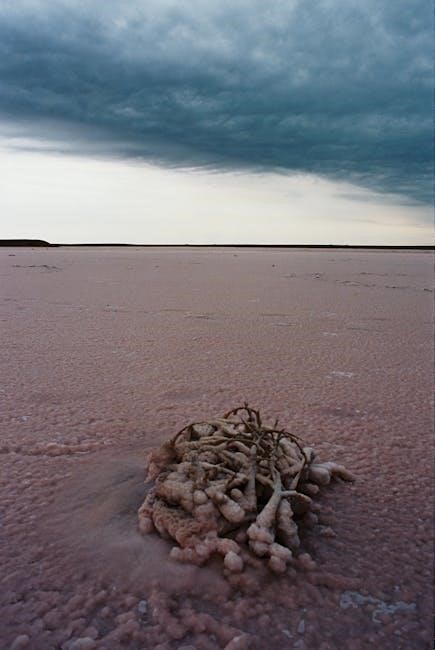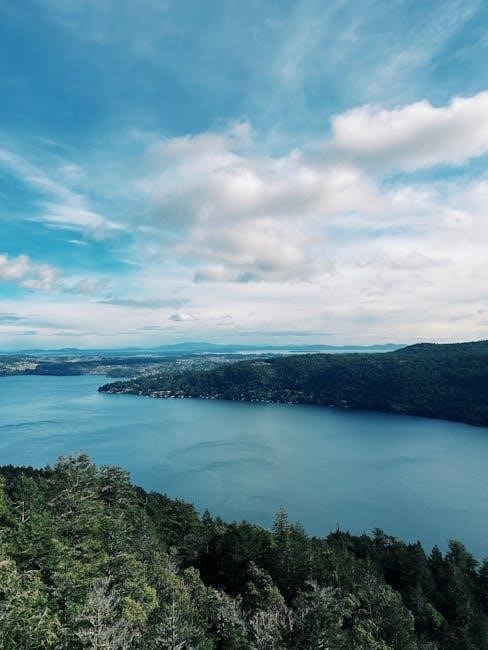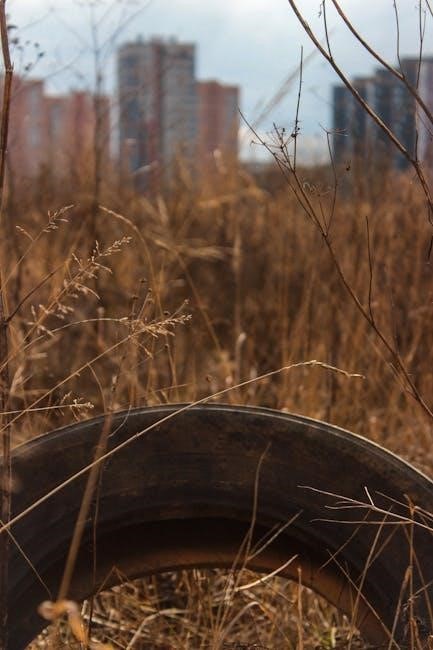the land of open graves pdf

The Land of Open Graves by Jason De León is a powerful ethnographic study of undocumented migration, shedding light on the harsh realities faced by migrants crossing the Sonoran Desert․
Overview of “The Land of Open Graves”
The Land of Open Graves by Jason De León is a captivating ethnographic study that delves into the harsh realities of undocumented migration․ Conducted over six years, the book combines ethnographic, archaeological, and forensic research to portray the perilous journey of migrants crossing the Sonoran Desert․ It exposes the brutality of U․S․ immigration policies and the extreme conditions faced by migrants, such as treacherous terrain and violence․ The inclusion of photographs by Michael Wells adds a poignant visual narrative, humanizing the migrants’ struggles․ This multidisciplinary approach not only enriches the understanding of migration but also serves as a critical commentary on border politics․ The book is a significant contribution to human rights discussions, offering a comprehensive and emotionally charged perspective on this pressing issue․

Importance of the Book in Understanding Migration Issues
The Land of Open Graves is a pivotal work in understanding migration issues, offering a unique perspective through its innovative blend of ethnographic, archaeological, and forensic research․ By documenting the experiences of migrants crossing the Sonoran Desert, the book sheds light on the humanitarian crisis often overlooked in political debates․ It challenges readers to confront the violence and suffering inherent in U․S․ immigration policies, while humanizing the migrants whose stories are frequently reduced to statistics․ The book’s interdisciplinary approach provides a comprehensive understanding of migration, making it an essential resource for scholars, activists, and the general public․ Its ability to bridge academic rigor with emotional storytelling underscores its importance in fostering empathy and advocating for human rights․

Background of the Book
The Land of Open Graves stems from six years of research by Jason De León, combining ethnography, archaeology, and forensic science to document migrant experiences․ Published in 2023, it features photographs by Michael Wells and is part of UCLA’s public anthropology curriculum, highlighting its academic and societal relevance․
Author Jason De León and His Research
Jason De León, an anthropologist and UCLA professor, conducted six years of interdisciplinary research for The Land of Open Graves․ His work combines ethnography, archaeology, and forensic science to examine the migration process between Latin America and the U․S․ De León’s research focuses on the Sonoran Desert, where he documented the lives and deaths of migrants․ His innovative approach uses archaeological methods to analyze discarded items, revealing the human stories behind migration statistics․ De León’s findings challenge policies and raise awareness about the human cost of border crossing․ His work has been recognized for its impact on human rights discussions and anthropological theory․
The Role of Ethnographic, Archaeological, and Forensic Research
The Land of Open Graves uniquely integrates ethnographic, archaeological, and forensic research to provide a comprehensive understanding of migration․ Ethnographic methods allow De León to capture migrants’ personal stories, while archaeological techniques analyze artifacts left behind, such as clothing and personal items, offering insights into their journeys․ Forensic research identifies remains and reconstructs causes of death, often linked to environmental factors like dehydration․ This interdisciplinary approach humanizes statistics, emphasizes the brutality of migration policies, and highlights the desert’s role as both a pathway and a grave․ By combining these methods, De León creates a vivid and unsettling portrayal of the migrant experience, bridging academic research with urgent human rights issues․
Key Themes and Findings
The Land of Open Graves exposes the brutality of U․S․ immigration policies and the extreme conditions migrants face in the Sonoran Desert, highlighting their suffering and deaths․
The Brutality of U․S․ Immigration Policies
Jason De León’s work in The Land of Open Graves reveals the harsh realities of U․S․ immigration policies, which often lead to the deaths of migrants attempting to cross the Sonoran Desert․ The book highlights how these policies, designed to deter undocumented migration, instead result in extreme suffering and loss of life․ De León’s research, which combines ethnographic, archaeological, and forensic methods, provides a chilling account of the violence and neglect faced by migrants․ The policies’ emphasis on border enforcement is shown to push migrants into more dangerous and remote areas, increasing the risk of death from exposure, dehydration, and other hazards․ This brutality is not just a byproduct of the policies but a direct consequence, as migrants are forced to endure inhumane conditions while seeking a better life․

Extreme Conditions Faced by Migrants in the Sonoran Desert
Migrants crossing the Sonoran Desert face extreme and life-threatening conditions, as documented in The Land of Open Graves․ The harsh environment includes blistering heat, dehydration, and exposure to the elements, which often prove deadly․ Jason De León’s research reveals how migrants endure these dangers while navigating a treacherous terrain with limited resources․ The desert’s remoteness and lack of access to aid exacerbate the risks, pushing many to the brink of survival․ Personal stories and forensic evidence in the book highlight the devastating consequences of these extreme conditions, which are further compounded by the physical and emotional toll of the journey․ The Sonoran Desert becomes a graveyard for many, underscoring the dire humanitarian crisis at the U․S․-Mexico border․

Impact and Reception
The Land of Open Graves has received widespread acclaim for its raw portrayal of migrant struggles, sparking crucial discussions on human rights and immigration policies globally․
Academic and Public Response to the Book
The Land of Open Graves has garnered significant academic and public attention for its groundbreaking exploration of undocumented migration․
Scholars have praised Jason De León’s innovative use of ethnography, archaeology, and forensic research, offering a unique perspective on the humanitarian crisis at the US-Mexico border․
The book has been hailed as a critical contribution to migration studies, human rights discussions, and anthropological theory, resonating with both academic audiences and the general public․
Its vivid storytelling and compelling visuals have sparked empathy and awareness, making it a vital resource for understanding the complexities of migration and its human cost․
The Book’s Contribution to Human Rights Discussions
The Land of Open Graves has significantly advanced human rights discussions by exposing the brutal realities faced by migrants in the Sonoran Desert․
Through its meticulous documentation of deaths, violence, and policy-related suffering, the book challenges readers to confront the ethical implications of border policies․
By humanizing the migrant experience, it bridges academia and activism, urging a more compassionate approach to migration issues․
Its impact extends beyond academia, influencing public discourse and advocating for policy reform to prevent further tragedies at the border․
The book’s contribution lies in its ability to frame migration as a human rights issue, emphasizing the need for dignity and justice for all individuals․
The Land of Open Graves is a profound examination of migration’s human cost, urging readers to reflect on justice, dignity, and the need for compassionate policy reform․
Final Thoughts on the Significance of “The Land of Open Graves”
The Land of Open Graves is a groundbreaking work that underscores the dire consequences of undocumented migration and the inhumane policies driving it․ By blending ethnography, archaeology, and forensic research, Jason De León provides a searing indictment of systemic violence and neglect at the U․S․-Mexico border․ The book not only humanizes the lives lost in the Sonoran Desert but also challenges readers to confront the moral and political failures perpetuating this crisis․ Its innovative approach has redefined how migration is studied and discussed, making it essential for scholars, activists, and anyone seeking a deeper understanding of this critical issue․ Ultimately, The Land of Open Graves serves as both a critique of injustice and a testament to the resilience of those who risk everything for a better life․